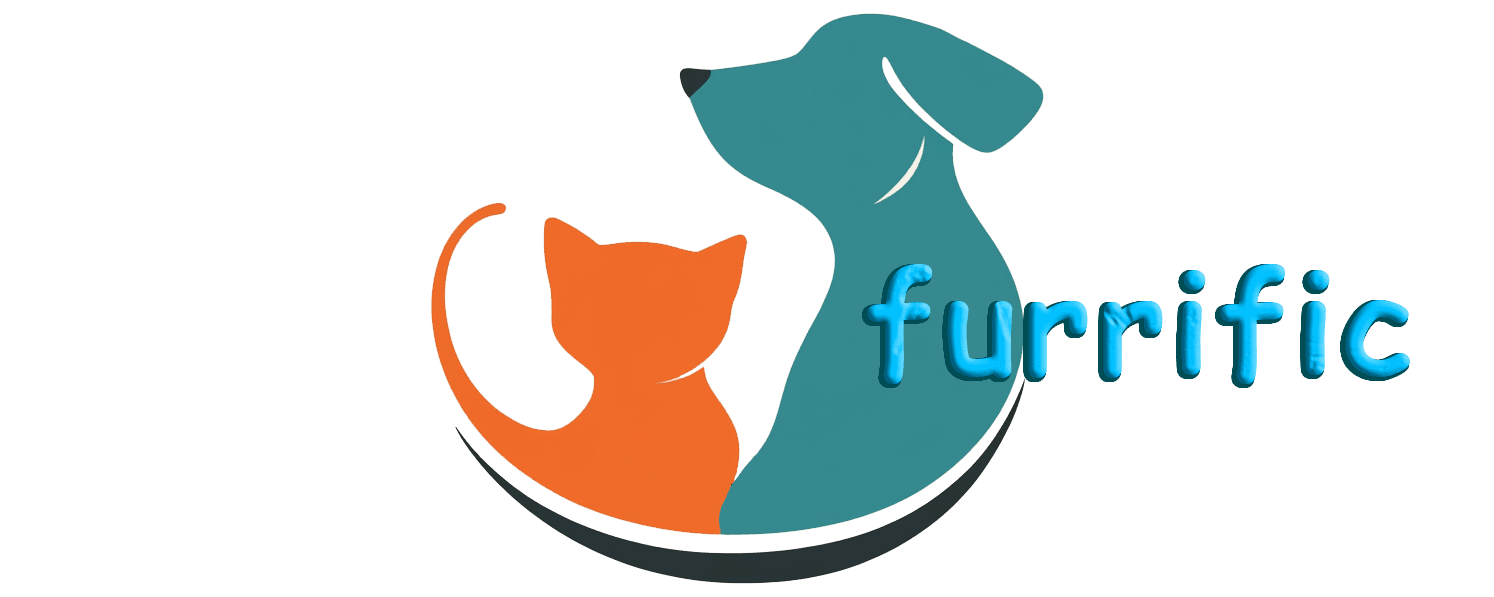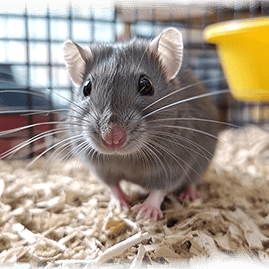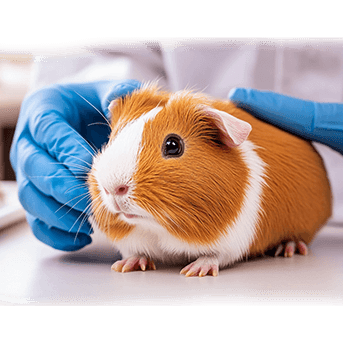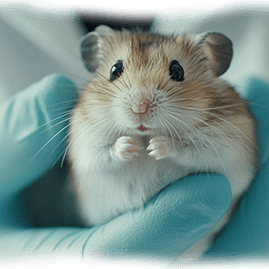Gerbil Health: A Comprehensive Guide to Keeping Your Pet Gerbil Healthy
Gerbils are energetic, curious little creatures that make wonderful pets, but they require specific care to stay healthy and happy. Understanding their unique health needs is essential for any responsible gerbil owner. From proper diet and exercise to preventing common health problems, this guide will provide you with everything you need to know about keeping your gerbil in tip-top shape.
General Health Tips for Gerbils
Regular Health Checks
Keeping a close eye on your gerbil’s behavior and physical condition is important for catching potential health problems early. Routine checks can help prevent many issues from becoming serious.
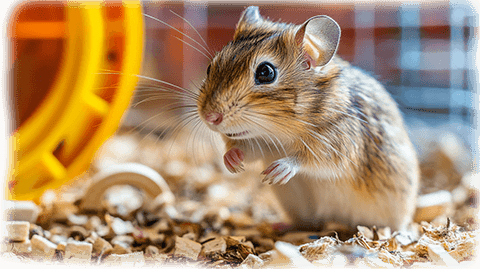
- Look for signs of a healthy gerbil:
- Bright, clear eyes with no discharge
- Smooth, shiny coat without bald patches
- Clean, pink ears free of wax buildup or redness
- Active and curious behavior
- Regular, firm stools
- Signs of a potential problem:
- Lethargy or hiding for long periods
- Diarrhea or changes in stool consistency
- Weight loss or lack of appetite
- Hair loss or skin irritation
- Wheezing, sneezing, or other breathing difficulties
If you notice any of these symptoms, it’s essential to consult a vet who is experienced with small animals, as gerbils can become seriously ill very quickly.
Diet and Nutrition
A well-balanced diet is crucial for keeping your gerbil healthy. In the wild, gerbils eat seeds, grains, and some fruits and vegetables, and their diet in captivity should reflect this.
- High-quality gerbil food mix – Look for commercial gerbil food that includes a mix of seeds, grains, and pellets. Ensure that it contains all essential vitamins and minerals. (Amazon affiliate link)
- Fresh vegetables and fruits – Offer small amounts of fresh veggies like carrots, cucumbers, and leafy greens. Avoid fruits high in sugar like grapes and bananas—too much sugar can lead to obesity or digestive problems.
- Protein supplements – You can occasionally offer gerbils a small piece of boiled egg or a mealworm for extra protein, which is beneficial, especially for growing or pregnant gerbils.
- Avoid harmful foods – Never feed your gerbil chocolate, onions, garlic, or raw potatoes. These can be toxic to gerbils.
Always ensure fresh water is available. Change the water daily to prevent contamination and ensure your gerbil stays hydrated.
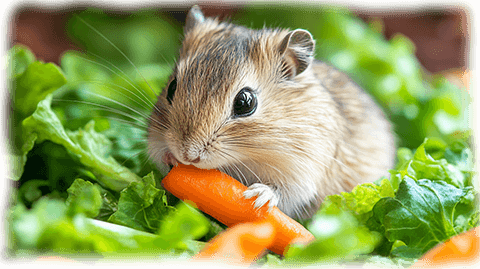
Exercise and Enrichment
Gerbils are very active animals that need plenty of exercise and mental stimulation to stay healthy.
- Provide an exercise wheel – A solid-surface exercise wheel allows your gerbil to run safely without injuring its tail. (Amazon affiliate link)
- Offer digging and burrowing opportunities – Gerbils love to dig, so provide a deep layer of bedding like aspen or paper-based substrates. Avoid cedar and pine shavings, which can be harmful to gerbils’ respiratory systems.
- Toys and tunnels – Use cardboard tubes, small wooden houses, and chewable toys to keep your gerbil entertained and mentally stimulated.
- Social interaction – Gerbils are social creatures and thrive in pairs or small groups. Ensure your gerbils have companions to interact with, as isolation can lead to stress and health problems.
Common Gerbil Health Issues
Despite your best efforts, gerbils can develop health problems. Here are some common health issues to watch for and tips on how to handle them.
Respiratory Infections
Gerbils are susceptible to respiratory problems, especially if their environment is too dusty or if they are exposed to drafts.
- Symptoms of respiratory infections:
- Wheezing, sneezing, coughing
- Nasal discharge or crusty nose
- Difficulty breathing or labored breathing
- Prevention tips:
- Keep your gerbil’s habitat clean and dust-free. Use low-dust bedding like paper or aspen and avoid cedar or pine shavings. (Amazon affiliate link)
- Place the cage in a well-ventilated but draft-free area.
- Treatment:
- If your gerbil shows signs of respiratory distress, visit a vet immediately. Infections are treatable with antibiotics, but they must be caught early.
Dental Problems
Gerbils’ teeth grow continuously throughout their lives, so it’s important to provide plenty of chewable materials to help them wear down their teeth naturally.
- Symptoms of dental issues:
- Drooling or wet fur around the mouth
- Difficulty eating or dropping food
- Overgrown, misaligned teeth
- Prevention tips:
- Provide plenty of wooden chew toys or untreated blocks of wood. (Amazon affiliate link)
- Regularly check your gerbil’s teeth for signs of overgrowth. If the teeth become too long, a vet may need to trim them.
- Treatment:
- If you notice any dental problems, consult your vet. Overgrown teeth can prevent your gerbil from eating properly, leading to malnutrition.
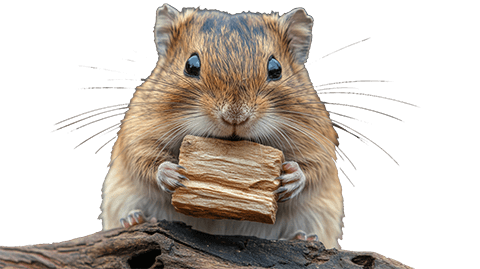
Diarrhea and Digestive Issues
Gerbils are sensitive to sudden dietary changes or the wrong types of food, which can lead to diarrhea.
- Causes:
- Eating too much fruit or sugary foods
- Sudden changes in diet or contaminated food/water
- Prevention tips:
- Introduce new foods slowly and in small amounts.
- Avoid feeding fruits or vegetables in excess.
- Ensure that your gerbil’s food and water are always clean and fresh. (Amazon affiliate link)
- Treatment:
- If your gerbil develops diarrhea, remove fresh fruits and vegetables from their diet and offer plenty of dry food. If the condition persists, consult a vet as diarrhea can lead to dehydration.
Skin and Fur Issues
Healthy gerbils have smooth, shiny fur, but they can develop skin and fur problems due to environmental conditions or poor hygiene.
- Symptoms of skin issues:
- Hair loss, bald patches
- Red, irritated skin or scabs
- Excessive scratching or grooming
- Causes and prevention:
- Skin issues can be caused by mites, fungal infections, or allergies. Keep the habitat clean and ensure the bedding is appropriate for gerbils.
- Regularly clean the cage and replace bedding to reduce the chance of mites or other parasites.
- Treatment:
- If you notice signs of skin or fur problems, it’s essential to have your vet assess the issue. They may prescribe treatments such as mite control or antifungal creams.
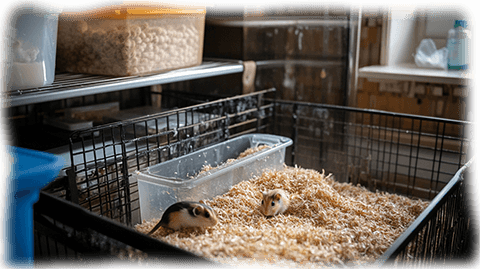
Gerbil Hygiene and Cage Cleaning
A clean environment is essential to prevent the spread of diseases in gerbils. Here are a few cleaning tips to keep your gerbil’s cage hygienic:
- Clean the cage weekly:
- Remove bedding and replace it with fresh material once a week. Clean food dishes and water bottles regularly.
- Spot clean daily:
- Remove uneaten food and droppings to maintain a tidy environment.
- Avoid harsh chemicals:
- Use mild, pet-safe cleaning products when cleaning the cage to prevent harmful fumes or residues.
When to See a Vet
Gerbils are small, delicate animals, and their health can decline quickly if issues are not addressed. If you notice any signs of illness or behavioral changes, it’s crucial to seek veterinary help immediately.
- When to seek veterinary care:
- Persistent diarrhea or constipation
- Labored breathing or signs of respiratory infection
- Noticeable weight loss or lethargy
- Overgrown or misaligned teeth
- Skin irritation, hair loss, or signs of mites
Regular veterinary check-ups are also recommended to catch any potential health issues before they become serious.
Conclusion
Keeping your gerbil healthy requires attention to diet, hygiene, and regular monitoring for signs of illness. By following these tips and providing a safe, stimulating environment, you can ensure your gerbil enjoys a long and happy life. Remember, early intervention is key when it comes to preventing and treating common gerbil health problems, so never hesitate to consult your vet if you notice anything out of the ordinary.
Reading materials: “Gerbils: The Complete Guide to Gerbil Care” (Amazon affiliate link) by Donna Anastasi.
Affiliate Disclosure
This post may contain affiliate links, which means I earn from purchases made through links. Please see the privacy policy page for more details.
